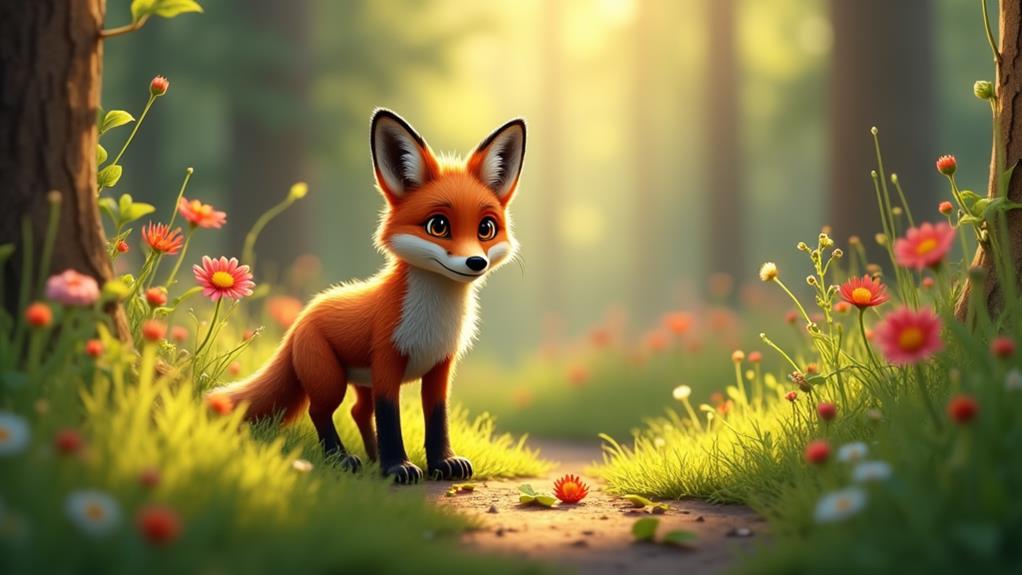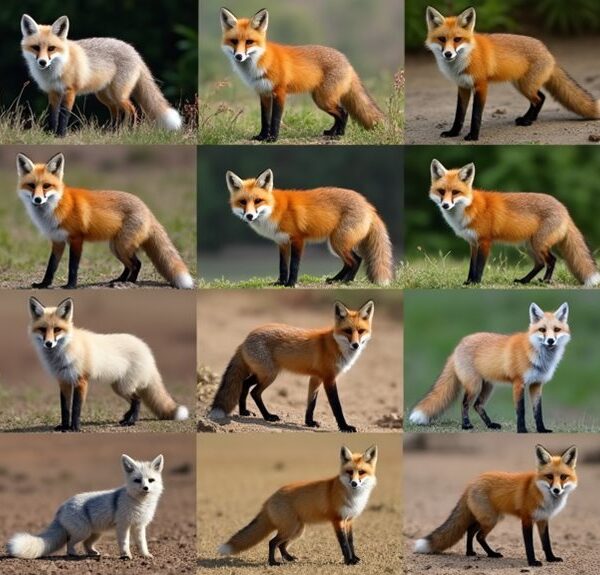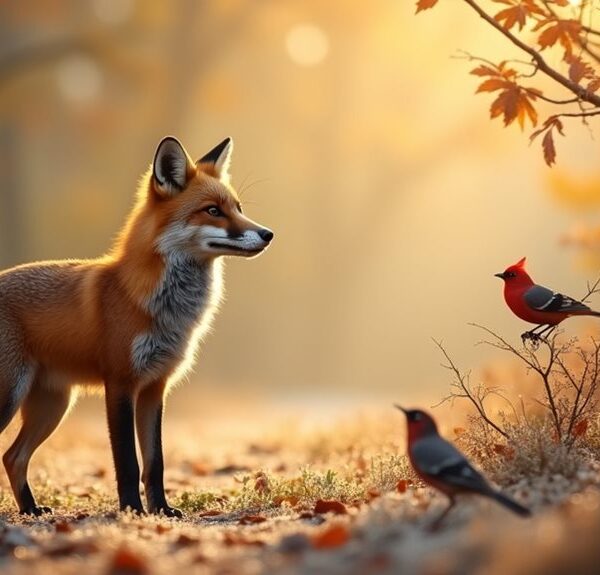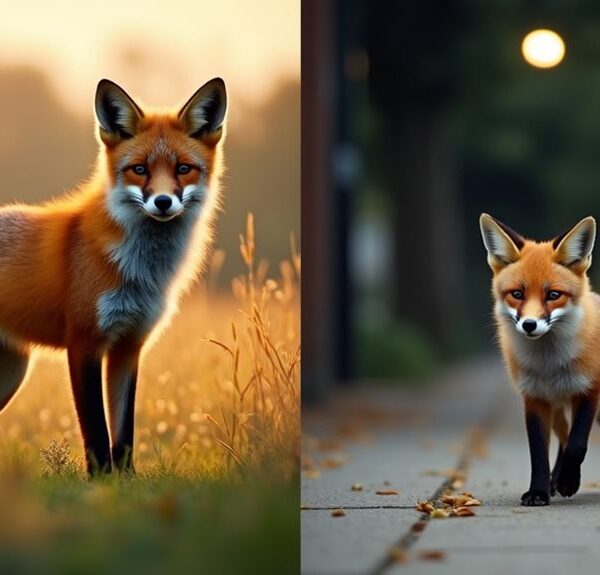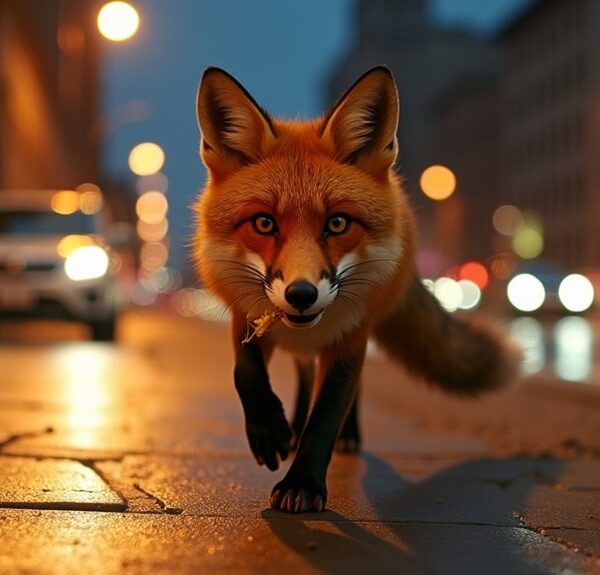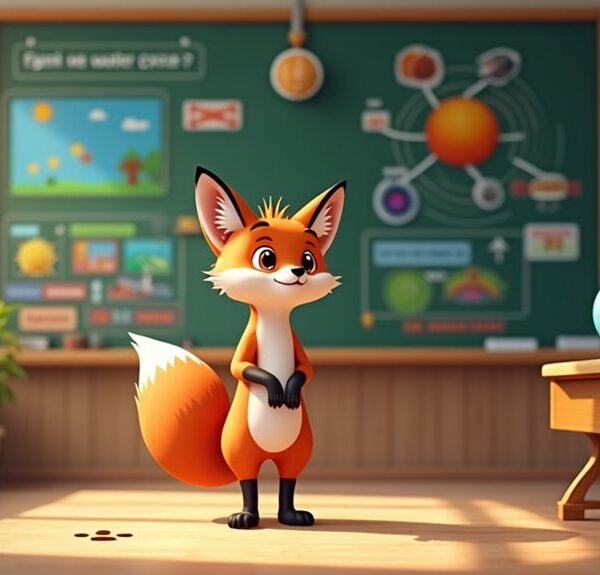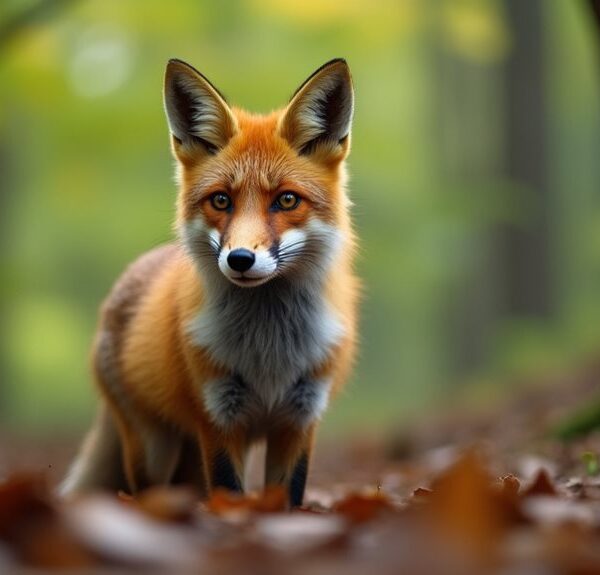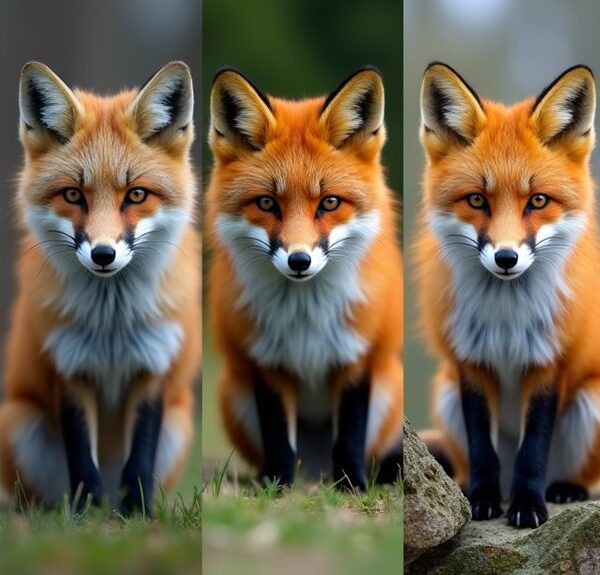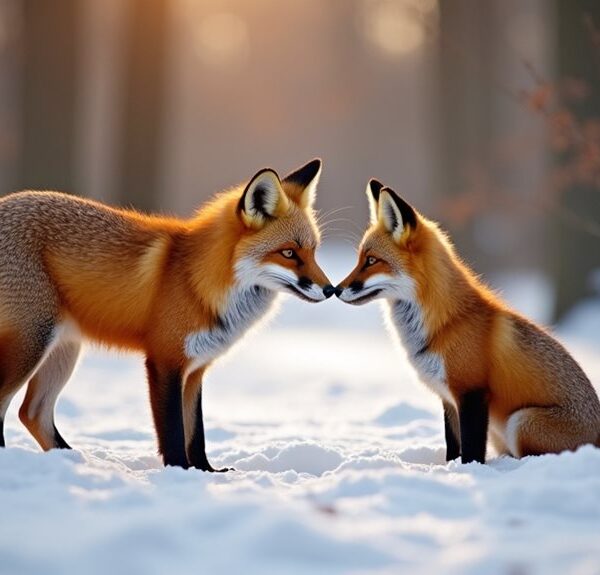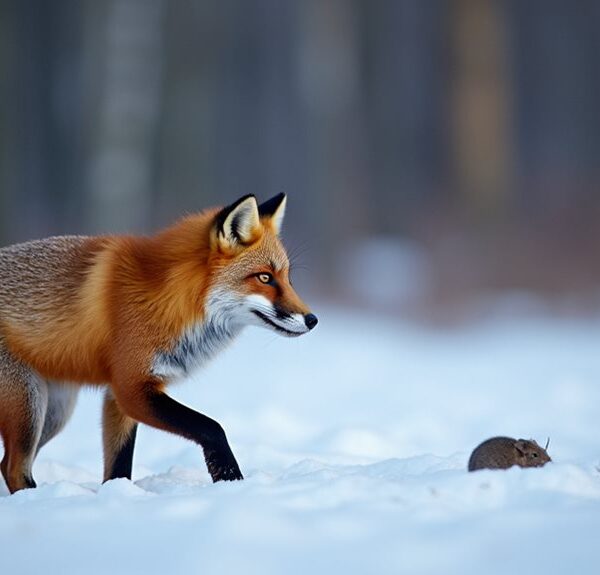When a fox stops and stares at you, it's not just admiring your style; it's sizing you up! That moment of stillness lets the fox assess if you're a friend or a foe, mixing curiosity with a touch of caution. Foxes are clever creatures with an excellent sense of smell and sharp hearing, allowing them to evaluate any potential threats or tasty snack options nearby. They've adapted to life around humans, so they're naturally curious about your actions. So, next time a lovely fox gives you the eye, know that there's a story behind that stare, and there's much more to discover about these fascinating animals!
Contents
Understanding Fox Behavior
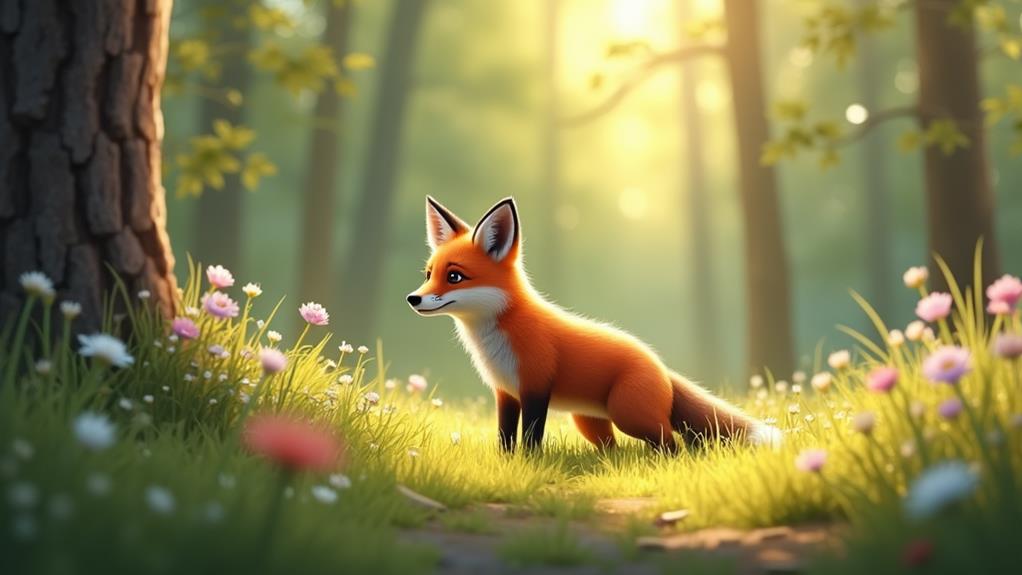
When you encounter a fox staring at you, it's likely a mix of curiosity and caution. Foxes are often social observers, peering at you to assess whether you're a friend or foe. Their keen eyesight helps them gauge potential threats, as they're naturally cautious animals.
In urban environments, for instance, this behavior reflects their remarkable adaptability and ability to thrive in human-influenced spaces, where they often interact more closely with people. If you see one frozen in place, it could be weighing its options—whether to stick around or scarper away.
Foxes are often solitary creatures, which means they're not used to human interactions. When they spot you, their instincts kick in, driving them to pause and evaluate the situation. Their strong sense of smell plays a big role too, as they've got a knack for sniffing out unfamiliar scents from a distance. Imagine them engaging in a little detective work!
This is part of their overall behavioral adaptation, allowing them to utilize various strategies for survival in different habitats, including those where they might encounter humans their comfort in urban areas.
Sometimes, this behavior can reflect their hunting techniques. They often freeze to study their environment, searching for movement in the shadows.
Sensory Perception in Foxes
Foxes rely heavily on their sensory perception to navigate their environment and respond to potential threats or prey. For red and gray foxes, this means they've got some serious skills up their furry sleeves! Their keen sense of hearing lets them detect high-frequency sounds, so they can identify movements or dangers nearby when they stop and stare. This adaption is essential, especially as they thrive in diverse habitats like forests and urban areas, where they encounter various stimuli and challenges.
But it doesn't stop there! These clever creatures also have a sharp sense of smell that helps them sniff out threats or potential meals its role in ecosystem balance. Imagine being able to "smell" information about things around you—that's what they do!
Plus, their excellent vision, especially in low-light conditions, allows them to spot sneaky critters at dawn and dusk when they're on the prowl.
And let's not forget about their whiskers! These furry sensors help them navigate tight spaces and gauge where to tread carefully. So, when a fox stands still and peers at you, it's likely evaluating whether you're friend or foe. It's like their version of Googling before making a decision.
Understanding their sensory world gives you insight into how they make choices that keep them safe!
Why Foxes Stare at Humans
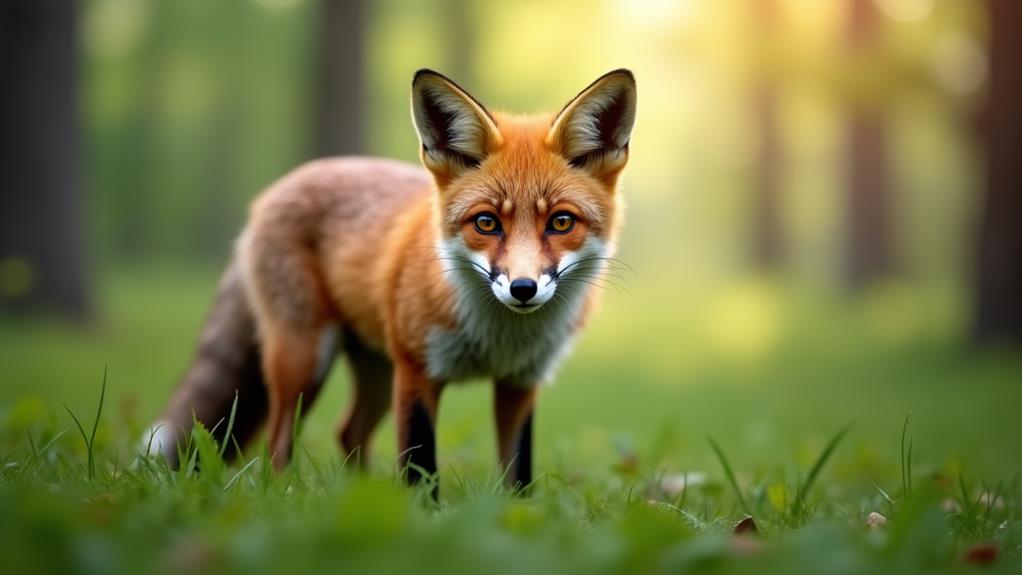
Have you ever caught a fox staring at you, and wondered what they're thinking?
Foxes might be sizing you up, checking if you're friend or foe, or just curious about what this bipedal creature is doing in their territory.
Their ability to observe humans reflects their strong adaptability as urban species, as they often coexist in environments where they can thrive.
It's all part of their secretive nature, as they observe us to figure out if we're a potential threat or perhaps a source of snacks!
Curiosity About Humans
Curiously observing humans, foxes often stop to stare, their instinctual caution driving this behavior. This fascinating display of attention reveals their strong curiosity about humans.
You might find it amusing that these clever creatures can be a bit like overly cautious kids peeking from behind a curtain.
Here are a few reasons why foxes stare at us:
- They're evaluating potential food sources, as they often associate humans with tasty treats.
- Their keen eyesight allows them to observe without getting noticed, making them stealthy observers.
- Staring helps them assess our body language and movements to judge our intentions.
- They're naturally cautious, balancing interest with wariness to stay safe.
- Curiosity about humans stems from a desire to understand our behaviors and patterns.
Assessing Potential Threats
When you spot a fox staring at you, it's likely judging whether you're a potential threat. These clever creatures have sharp senses, allowing them to evaluate their surroundings before making any bold moves. With their outstanding hearing and keen eyesight, they notice the tiniest movements and sounds, helping them decide if you're friend or foe.
When a fox pauses to stare, it's not just about you. They're judging potential threats to figure out if the area is safe and secure. Think of it as a little game of "who's who" in the wild, with the fox playing detective. Curiosity drives them, as they want to investigate anything unusual, including you!
This moment of observation is essential for their survival. By gauging potential risks, these animals can continue their daily routines, whether they're hunting for dinner or just exploring.
So next time you find yourself locked in a staring contest with a fox, remember they're just sizing you up, channeling their inner explorer. It's like they're saying, "Are you going to help me find my next meal or scare me away?"
Either way, it's a fascinating glimpse into their world!
Communication Through Staring
Foxes often fixate their gaze on humans, using the stare as a form of communication that conveys curiosity and caution.
When you encounter a fox that's paused to take you in, remember that this moment reveals much about their feelings. They're not just checking you out; they might be processing a range of emotions and instincts.
Here's what that stare might mean:
- Curiosity: They're intrigued about who you are.
- Caution: They want to guarantee you're not a threat.
- Dominance: Sometimes, it's a way to assert their place in the area.
- Food Association: If they've been fed before, they may hope for a tasty snack.
- Inquisitive Nature: Their clever minds are always considering new information.
The Role of Curiosity
Curiosity plays a huge role in why foxes often stare at us.
You see, these clever little creatures are wired to be aware of their environment, and they can't help but check out new smells or movements, even if it's just you enjoying a picnic.
It's like they're thinking, "Are you a friend or a foe?" while they consider whether to come closer for that sandwich or keep a safe distance!
Natural Instincts
In the wild, the curious nature of foxes often leads them to stop and observe their surroundings intently. When you see a fox, it's likely that its keen instincts are at play. These clever creatures have a unique way of evaluating their world, which often includes sizing up potential threats, and yes, even you!
Here are some reasons why they pause:
- They've got sharp hearing, picking up sounds you might miss.
- They want to determine whether something is a friend or foe.
- This behavior is all part of their hunting strategy.
- Curiosity about large animals, including humans, fuels their interest.
- Adapting to urban life makes them intrigued by our actions.
When you pause to admire a fox, know that it's doing the same with you! By stopping and staring, they're figuring out if they should approach or retreat.
Their natural instincts drive this delightful behavior, and who can blame them? Observing their surroundings keeps them safe and allows them to thrive.
Environmental Awareness
A remarkable aspect of foxes is their ability to adapt to various environments, including urban spaces. Their curiosity shines through when you see them stopping and staring. You might wonder what's going on in their little heads! This behavior stems from their instinctive need to gather information.
Foxes have incredibly sharp senses; they rely on their keen sight and hearing to determine if you're a threat or a potential snack. When they pause and examine, it's like a mini investigation. They look around, evaluating the environment, and figuring out if they should approach or run away.
If they sense no danger, they might even inch closer. But if you're too loud or sudden, they're quick to back off.
Interestingly, urban foxes, who often see humans, tend to be less fearful. Their comfort level allows them to stop and stare more often, blending the wild with urban life.
Social Interaction
Foxes captivate us with their curious nature, often pausing to observe their surroundings—especially when humans are nearby. Their inquisitive behavior reveals just how intelligent they really are. When foxes stop and stare, it's not just to keep an eye on potential threats; it's also a form of social interaction.
Here's what you might notice about this fascinating behavior:
- They communicate through body language.
- Eye contact can show interest or caution.
- Being non-aggressive, they're often more curious than afraid.
- They adapt to human activity, learning what to expect.
- Senses like sight and hearing help them gauge their environment.
Foxes prefer environments where they feel safe, which sometimes includes urban areas with plenty of food sources.
You might find it amusing that while you're simply enjoying a day outdoors, a fox could be quietly evaluating the situation, as if deciding whether you're friend or foe.
This blend of curiosity and caution showcases their adaptability and intelligence. It's a reminder that every encounter with wildlife enriches our understanding of nature—let's celebrate the charm of these wonderful creatures!
Foxes and Their Environment
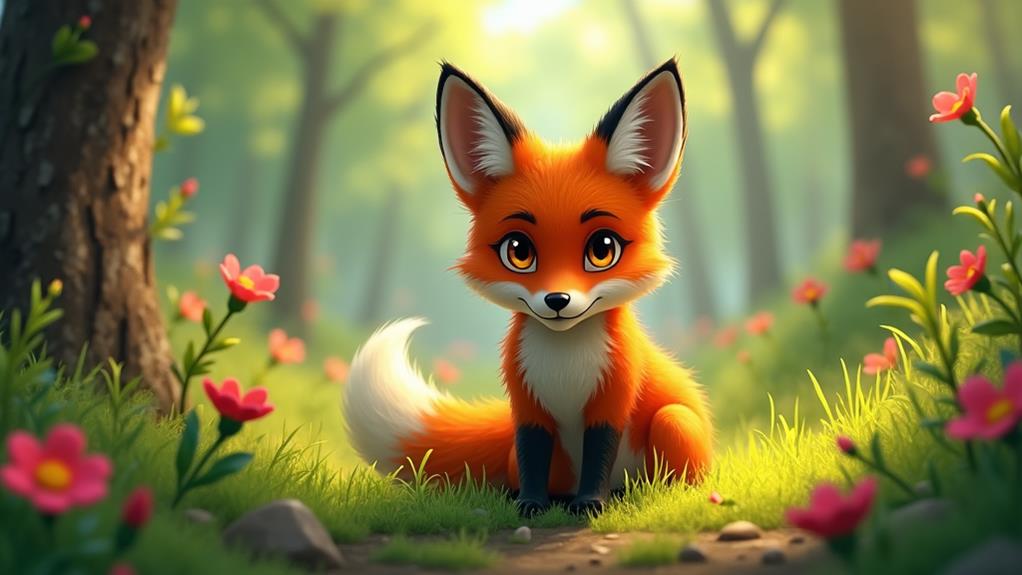
The environment surrounding foxes plays an essential role in shaping their behavior and survival strategies. As you observe a fox, you might notice how it suddenly stops and stares. This isn't just a quirky habit; it's a natural instinct. Foxes are predators, with a highly developed sense of hearing and smell that helps them detect threats or potential prey from afar. When they pause, they're evaluating their surroundings, deciding whether to stay put or dart away.
Foxes are usually solitary creatures, and those moments of stillness can help them assess the presence of other animals or curious humans in their territory. Living in diverse environments, including urban areas, keeps them on their toes. They might stop and observe you—perhaps you're just a quirky human, or maybe a potential snack!
Their keen observational skills are crucial for survival; these pauses allow them to spot danger or recognize opportunities. So, if you catch a fox staring at you, remember—it's not just being nosy; it's focused on understanding its world.
Embrace the wonder of nature and appreciate these clever creatures for the brilliant tactics they employ every day!
Safety Considerations Around Foxes
When encountering a fox, it's important to remember that safety should always come first. These clever creatures can be curious, but you must prioritize your well-being and that of your pets.
Here are some key points to keep in mind:
- Maintain a safe distance if you spot a fox. Observe from afar to avoid startling it.
- If a fox gets too close or acts boldly, some loud noises or a splash of water can encourage it to retreat.
- Watch small pets closely when they're outside. Foxes see them as potential prey, so it's wise to keep an eye out!
- If a fox seems sick or unusually friendly, approach with caution; it might've health issues like rabies.
- Always report unusual behaviors, including bites, to your local animal control and seek medical help if needed.
And remember, foxes can be attracted by pet food left out in your yard.
Keeping your trash secured and food indoors can help keep them at bay. It's all about maintaining harmony while coexisting with these fascinating animals.
Stay alert, and you'll be just fine!
Final Thoughts
Next time you spot a fox pausing and staring at you, don't be alarmed; it's just their curious nature kicking in! They see you as a fascinating figure in their domain, much like a character in their own little story. Remember, foxes are smart and playful, so appreciate the moment. Just like you would with a friend who can't help but gawk at something unusual, enjoy that brief connection. Nature's wonders never cease to amaze!

